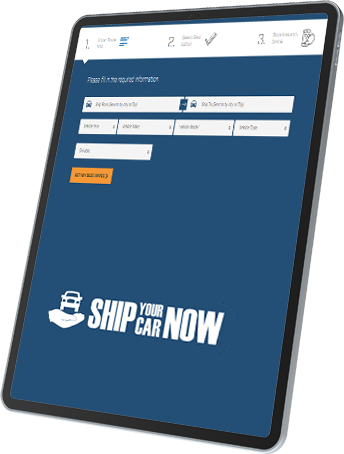Pennsylvania Car Shipping Services
An Pennsylvania Car Shipping Company You Can Trust
We Value Our Reputation
See What Customers Are Saying About Us:
(19089 reviews)
4.7

BBB
(3822 reviews)
4.6

Consumer Affairs
(1323 reviews)
4.0
Birdeye
(2797reviews)
4.9
Trustindex verifies that the original source of the review is Google. “Ship Your Car Now” delivered as promised. From Florida to Washington State only took 4 days, from the time of pickup to delivery in Spokane. Gary W was in contact with me throughout the whole process, he made sure I felt at ease and contracted his most reliable partner. 100% would recommend SYCW to anyone.Trustindex verifies that the original source of the review is Google. Car was delivered on time . Driver was friendly. Price was good . And did not changed Luke other's I use in the past. Thank you Gary . *****Trustindex verifies that the original source of the review is Google. EXCELENTE SERVICIO LO RECOMIENDO.Trustindex verifies that the original source of the review is Google. I shipped a friend’s SUV by a simple call to Todd Carlisle. It was picked up on our preferred date with a price below my expectation. The car was delivered to the friend in Chicago 2 days later. The process was very smooth and good.Trustindex verifies that the original source of the review is Google. Thank you Todd Carlisle! And driver: Levan! Car has arrived safely! Highly recommend both of them!Trustindex verifies that the original source of the review is Google. Todd Carlisle did a great job of arranging the transport of our car. This was our first time shipping a vehicle. He explained the process thoroughly and was always available to answer questions. He is friendly, knowledgeable and professional. A neighbor recommended them and had shipped their car multiple times. We look forward to working with Todd in the future.Trustindex verifies that the original source of the review is Google. Outstanding Service and Experience! Wanted to thank and recommend Jason Woesnner and the ShipYourCarNow Customer Service team for the outstanding service they provided on two shipments each way across the US over a 2 week period. The last delivery was tricky as we had a health issue with a member of our family that required us to cancel and reinstate a shipment within a 10 hour period of time over the past weekend. Jason worked the lines double time to make happen and the weekend CS team coordinated details with the carrier. Communications between all parties beyond expectation. Overall, It was a success with a delivery time of less than 3 days - FL to CA. This is your team that makes things happen! Happy holidays - Doug GTrustindex verifies that the original source of the review is Google. It pays to deal with a pro! I delt with Todd Carlisle. After he explianed how things worked, I went with it. Delivered on time by another pro. I couldn't have asked for a better delivery. So, don't mess with the others, THIS is the only way to go. Nice job Todd!Trustindex verifies that the original source of the review is Google. I want to share our experience using Ship Your Car Now and representative Todd Carlisle. After checking with other carriers I talked personally with Todd and he made me feel confident that we had selected the right carrier. It was an easy transaction and the car was picked up and delivered on time without any issues. Todd communicated all along the way. I highly recommend Ship Your Car Now and Todd Carlisle for transport of your vehicle.
What customers say about shipping a car to
or from Alabama with ShipYourCarNow:



Trustindex verifies that the original source of the review is Google. “Ship Your Car Now” delivered as promised. From Florida to Washington State only took 4 days, from the time of pickup to delivery in Spokane. Gary W was in contact with me throughout the whole process, he made sure I felt at ease and contracted his most reliable partner. 100% would recommend SYCW to anyone.Trustindex verifies that the original source of the review is Google. Car was delivered on time . Driver was friendly. Price was good . And did not changed Luke other's I use in the past. Thank you Gary . *****Trustindex verifies that the original source of the review is Google. EXCELENTE SERVICIO LO RECOMIENDO.Trustindex verifies that the original source of the review is Google. I shipped a friend’s SUV by a simple call to Todd Carlisle. It was picked up on our preferred date with a price below my expectation. The car was delivered to the friend in Chicago 2 days later. The process was very smooth and good.Trustindex verifies that the original source of the review is Google. Thank you Todd Carlisle! And driver: Levan! Car has arrived safely! Highly recommend both of them!Trustindex verifies that the original source of the review is Google. Todd Carlisle did a great job of arranging the transport of our car. This was our first time shipping a vehicle. He explained the process thoroughly and was always available to answer questions. He is friendly, knowledgeable and professional. A neighbor recommended them and had shipped their car multiple times. We look forward to working with Todd in the future.Trustindex verifies that the original source of the review is Google. Outstanding Service and Experience! Wanted to thank and recommend Jason Woesnner and the ShipYourCarNow Customer Service team for the outstanding service they provided on two shipments each way across the US over a 2 week period. The last delivery was tricky as we had a health issue with a member of our family that required us to cancel and reinstate a shipment within a 10 hour period of time over the past weekend. Jason worked the lines double time to make happen and the weekend CS team coordinated details with the carrier. Communications between all parties beyond expectation. Overall, It was a success with a delivery time of less than 3 days - FL to CA. This is your team that makes things happen! Happy holidays - Doug GTrustindex verifies that the original source of the review is Google. It pays to deal with a pro! I delt with Todd Carlisle. After he explianed how things worked, I went with it. Delivered on time by another pro. I couldn't have asked for a better delivery. So, don't mess with the others, THIS is the only way to go. Nice job Todd!Trustindex verifies that the original source of the review is Google. I want to share our experience using Ship Your Car Now and representative Todd Carlisle. After checking with other carriers I talked personally with Todd and he made me feel confident that we had selected the right carrier. It was an easy transaction and the car was picked up and delivered on time without any issues. Todd communicated all along the way. I highly recommend Ship Your Car Now and Todd Carlisle for transport of your vehicle.
Cost & Delivery Estimates - Shipping Your Car from Pennsylvania
| Ship Car From | Ship Car To | Estimated Route Distance | Estimated Delivery Time | Estimated Cost |
|---|---|---|---|---|
| Pennsylvania | Texas | 1,626.80 | 5-6 days | $975 |
| Pennsylvania | California | 2,734.10 | 7-8 days | $1,145 |
| Pennsylvania | Arizona | 2,176.90 | 6-7 days | $1,135 |
| Pennsylvania | Virginia | 381.4 | 1-2 days | $435 |
| Pennsylvania | Florida | 1,137.70 | 3-4 days | $775 |
Cost & Delivery Estimates - Shipping Your Car to Pennsylvania
| Ship Car From | Ship Car To | Estimated Delivery Time | Estimated Route Distance | Estimated Cost |
|---|---|---|---|---|
| Texas | Pennsylvania | 5-6 days | 1,626.80 | $815 |
| California | Pennsylvania | 7-8 days | 2,734.10 | $1,215 |
| Arizona | Pennsylvania | 6-7 days | 2,176.90 | $1,075 |
| Virginia | Pennsylvania | 1-2 days | 381.4 | $465 |
*Disclaimer: Please note that all durations, distances, and estimated costs provided in this table are general or best estimates. Actual shipping durations, distances, and costs may vary depending on various factors such as specific origin and destination locations, vehicle type, shipping method, seasonal variations, and other circumstances. Each shipping scenario is unique, and additional factors not accounted for in these estimates may impact the final shipping details. For accurate and personalized shipping information tailored to your specific needs, please start a free quote.
Pennsylvania Auto Transport Solutions
That Beats The Competition
Are you seeking a reliable and cost-effective solution for Pennsylvania car shipping? This straightforward guide offers direct answers to your pressing concerns. Discover the actual costs to ship your vehicle, learn the logistics involved, and find out how to choose a dependable transport service. No fluff, just the essentials for organizing your car’s transportation to or from Pennsylvania, whether for a move, sale, or any other reason. Get ready to navigate the auto shipping process with ease.

(19089 reviews)
4.7

BBB
(3822 reviews)
4.6

Transport Reviews
(11049 reviews)
4.8
My Moving Reviews
(19089 reviews)
4.7
Trusted by world's largest brands








How our Pennsylvania car shipping works
Let’s take a quick tour of how the car shipping process works in Pennsylvania. The journey of your vehicle from its current location to its new home can be condensed into three basic steps – getting a quote, scheduling a pickup, and finally, receiving your vehicle at the destination.
Let’s delve into each of these steps in detail.
-
Step 1
The first step in the car shipping journey is requesting a quote, which sets the stage for a tailored transport plan. -
Step 2
Once you’re comfortable with the quote, the next step is scheduling the pickup and delivery of your vehicle. Booking is straightforward, either online or via a phone call -
Step 3
The final step in the car shipping process is perhaps the most reassuring. As your vehicle embarks on its journey, ShipYourCarNow provides regular updates

Factors Affecting Pennsylvania Car Shipping Costs & Timelines
The cost and timelines for shipping your car to or from Pennsylvania are influenced by various factors. The most significant factor is the distance between the pickup and delivery locations. Typically, shipping costs per mile decrease as the distance increases, with different rates for short, medium, and long distances. Pennsylvania’s geographical location and proximity to major cities and highways such as I-76, I-80, I-95, and I-476 also affect the shipping costs and timelines.
Other factors include the vehicle’s size, weight, and operability, the type of auto transportation chosen, and the time of year or any special requests.
Preparing Your Vehicle for Pennsylvania Car Shipping
Once you have chosen your car shipping company, it’s crucial to properly prepare your vehicle for shipping. Here are some steps to follow:
- Start by cleaning your vehicle inside and out, which makes it easier to identify any existing damage, such as chips or scratches.
- Remove any personal items and special accessories, but ensure that standard equipment like the spare tire and jack remains in the vehicle.
- Check the battery, tire pressure, and all vehicle fluids, ensuring they are at the correct levels.
Also, ensure that the gas tank contains no more than a quarter tank of fuel to minimize the weight during transport. Finally, disable the car alarm or provide instructions to the transport driver on how to deactivate it if necessary.
Essential Car Shipping Preparation in Alabama
Proper preparation of your vehicle for shipping is essential, involving steps like cleaning, maintenance, battery disconnection, and choosing the right transport option — open for standard vehicles and enclosed for high-value cars — to ensure safe and efficient delivery.
Car Shipping Services
Ship with Confidence with ShipYourCarNow
OPEN TRANSPORT
Open vehicle transportation for shipping your car is a practical and cost-effective solution that ensures efficient and reliable delivery.
DOOR-TO-DOOR
Door-to-door service is tailored for convenience and reliability, ensuring that your vehicle arrives at its destination on time and in pristine condition.
Frequently Asked Questions
Typically, for any transport, we ask for 3-5 days to locate a driver. However, it is common to find a driver more quickly on popular routes.
Yes. We stand by our pricing unless any information you provide when getting your quote changes or is incorrect. Any potential changes in information from what was originally quoted is subject to a pricing review.
We recommend that you do not have any personal belongings inside your vehicle during your transport. Any items left in the vehicle are shipped at your own risk as auto transport insurance does not cover any loss or damage of personal items left in the vehicle during transport. In addition, it is important to know that if your car is packed full of your belongings, a driver has the right to refuse service of the vehicle.
Lorem ipsum dolor sit amet, consectetuer adipiscing elit. Aenean commodo ligula eget dolor. Aenean massa. Cum sociis natoque penatibus et magnis dis parturient montes, nascetur ridiculus mus.
This can vary, but we recommend a week in advance minimum if possible. Our reservations are free to set up with no strings attached, so the more notice, the better.
When you ship your vehicle with us you can rest assured that the carrier assigned to move your car is fully insured and licensed with the FMCSA (Federal Motor Carrier and Safety Administration). You vehicle is covered by the carrier’s insurance policy that is doing the hauling. Depending on the type and size of the trailer being used, the insurance policy can cover from $100,000 to $1,000,000 of damage.
There are several key factors that change the cost of auto shipping including: size and weight of the vehicle, the vehicle’s condition, the transport type you choose, the shipping distance, and overall market variability. Receive an instant car shipping quote when you fill out this form, or call one of our agents to learn the exact cost of shipping.

Get Started with ShipYourCarNow
Get a personalized quote for your Alabama Journey!
